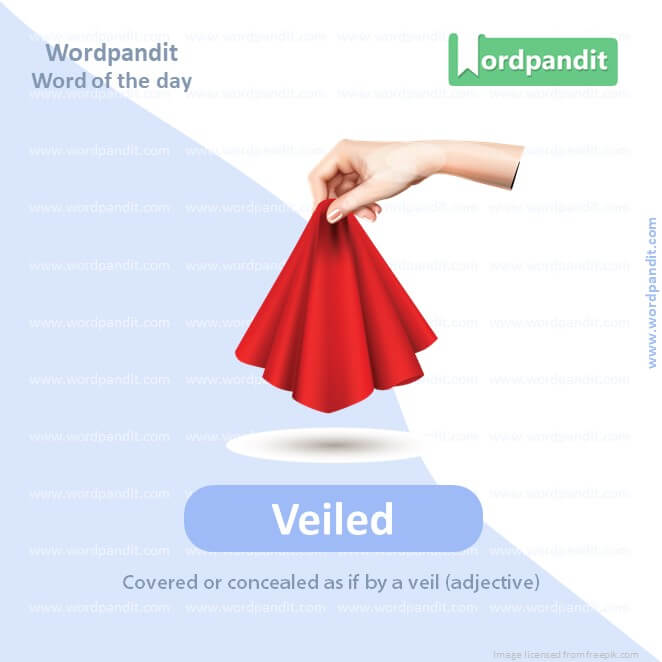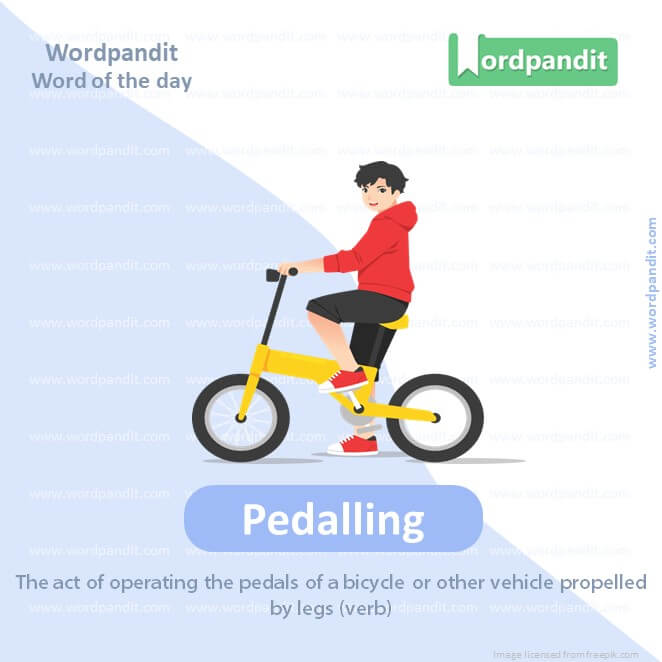Daily Vocabulary Words: List of Daily Used Words
Hi there. Welcome to this special section @ Wordpandit.
Our endeavour here is straightforward: highlighting important daily vocabulary words, you would encounter in The Hindu. This is your repository of commonly used words; essentially, we are posting a list of daily used words. Hence, this has significant practical application as it teaches you words that are commonly used in a leading publication such as The Hindu.
Visit the website daily to learn words from The Hindu.

WORD-1: Willing
CONTEXT: Republican House Speaker Mike Johnson has not revealed whether he would be willing even to put a foreign aid-only bill on the floor for a vote.
SOURCE: The Hindu
EXPLANATORY PARAGRAPH: Imagine you really want to share your toys with your friend. You are not forced or told by someone to do it; you just feel like it because it makes you happy. That feeling when you are ready and happy to do something, like sharing, helping, or playing, is what we call being willing. It’s like when you say “yes” with a big smile because you want to, not because you have to.
MEANING: Ready and cheerful in offering to do something (adjective).
PRONUNCIATION: WIL-ing
SYNONYMS: eager, ready, inclined, disposed, keen, enthusiastic
USAGE EXAMPLES:
1. She was willing to help her friend finish the project.
2. He is always willing to share his snacks during break time.
3. The puppy was willing to follow its owner anywhere.
4. They were willing to consider his proposal.

WORD-2: Veiled
CONTEXT: While delivering the inaugural address of the State’s Interim Budget, Andhra Pradesh Chief Minister Y.S. Jagan Mohan Reddy made a statement that is being seen by many as a veiled attack against the Bharatiya Janata Party (BJP)-led government at the Centre.
SOURCE: The Hindu
EXPLANATORY PARAGRAPH: Imagine you are playing peek-a-boo with a thin cloth over your face. You can see a little through it, but not everything is clear. This cloth is like a secret cover that hides your face partially. When something is hidden or not completely shown, like your face with the cloth, we say it is veiled. It’s like having a secret or something that is not fully seen or understood.
MEANING: Covered or concealed as if by a veil (adjective).
PRONUNCIATION: VAYLD
SYNONYMS: hidden, concealed, masked, shrouded, obscured, cloaked
USAGE EXAMPLES:
1. Her veiled smile hinted she knew the surprise.
2. The message was delivered with a veiled warning.
3. The veiled statue was unveiled at the ceremony.
4. She wore a veiled hat that added mystery to her look.

WORD-3: Apathy
CONTEXT: For the first time since he became Chief Minister, Mr. Reddy has made a statement that hints at the apathy of the Union government in giving Special Category Status (SCS) to Andhra Pradesh.
SOURCE: The Hindu
EXPLANATORY PARAGRAPH: Imagine you have a toy, but you don’t feel like playing with it. You’re not sad, not happy, not anything; you just don’t care about it right now. That feeling when you don’t have interest or excitement about things that usually make you happy or sad is called apathy. It’s like when you shrug your shoulders because you don’t feel like doing anything or caring about what’s happening.
MEANING: Behaviour that shows no interest or energy and shows that someone is unwilling (noun).
PRONUNCIATION: AP-uh-thee
SYNONYMS: indifference, disinterest, unresponsiveness, lethargy, listlessness, impassivity
USAGE EXAMPLES:
1. There was a sense of apathy among students about the homework assignment.
2. His apathy towards sports was evident when he chose to read instead.
3. The campaign aimed to overcome voter apathy.
4. She showed apathy towards the choices given to her.

WORD-4: Pedalling
CONTEXT: Though Mr. Reddy had made SCS one of his main poll planks in 2019, he has been soft-pedalling the issue since, as his YSR Congress Party has always tried to maintain a good relationship with Prime Minister Modi and Home Minister Amit Shah. The YSRCP has supported the National Democratic Alliance both within and outside Parliament.
SOURCE: The Hindu
EXPLANATORY PARAGRAPH: Imagine you’re on a bicycle, and you use your feet to push those round things at the bottom to make the bike move. This action of pushing round and round with your feet to go places on your bike is called pedalling. It’s how you make the bike go forward, backward, or even go faster when you want to race with your friends.
MEANING: The act of operating the pedals of a bicycle or other vehicle propelled by legs (verb).
PRONUNCIATION: PED-uh-ling
SYNONYMS: cycling, biking, pushing, riding, turning, operating
USAGE EXAMPLES:
1. He was pedalling as fast as he could to win the race.
2. She started pedalling slowly, enjoying the scenic route.
3. They spent the afternoon pedalling through the park.
4. He stopped pedalling to catch his breath.
WORD-5: Vociferous
CONTEXT: All through this, while it is true that the party has been dissatisfied with the Central government for not granting the SCS to Andhra Pradesh, it has never been vociferous in its demand. The Opposition recognised this and saw in the situation an opportunity to attack Mr. Reddy.
SOURCE: The Hindu
EXPLANATORY PARAGRAPH: Imagine someone talking really loud and strong because they feel very strongly about something, like when you really, really want something and you keep asking for it loudly so everyone can hear. This loud and strong way of speaking or shouting because you have strong feelings or opinions is called being vociferous. It’s like when you can’t keep quiet because you want to make sure everyone hears what you have to say.
MEANING: Expressing feelings or opinions in a very loud or forceful way (adjective).
PRONUNCIATION: vo-SIF-er-us
SYNONYMS: loud, clamorous, noisy, boisterous, strident, vehement
USAGE EXAMPLES:
1. The crowd became more vociferous as the debate heated up.
2. She was vociferous in her opposition to the new policy.
3. The vociferous fans cheered wildly for their team.
4. His vociferous complaint was heard by everyone in the room.

WORD-6: Resurgent
CONTEXT: But the heat is picking from the Congress, which is in a resurgent mood in Andhra, especially after Mr. Reddy’s sister, Y.S. Sharmila, was made president of the Andhra Pradesh Congress Committee earlier this year. Ms. Sharmila has demanded that the government hold a discussion in the floor of the Assembly on the “betrayal of the people of Andhra Pradesh by the BJP government at the Centre in the last 10 years” and pass a resolution on the “rights of the people of Andhra Pradesh” and send it to the Centre and the President for their approval.
SOURCE: The Hindu
EXPLANATORY PARAGRAPH: Imagine your favorite superhero who was defeated by a villain but then gets up, stronger than before, ready to save the day again. This coming back stronger after being down or away for a while is what we call resurgent. It’s like when you fall down but then stand up, dust yourself off, and are ready to try again, even better than before.
MEANING: Increasing or reviving after a period of little activity (Adjective).
PRONUNCIATION: re-SUR-jent
SYNONYMS: revived, renewed, revitalized, reborn, rejuvenated, restored
USAGE EXAMPLES:
1. The resurgent team surprised everyone by winning the championship.
2. Interest in the traditional art form is resurgent.
3. The resurgent economy showed signs of improvement.
4. After a period of decline, the band’s popularity is resurgent.
WORD-7: Betrayal
CONTEXT: But the heat is picking from the Congress, which is in a resurgent mood in Andhra, especially after Mr. Reddy’s sister, Y.S. Sharmila, was made president of the Andhra Pradesh Congress Committee earlier this year. Ms. Sharmila has demanded that the government hold a discussion in the floor of the Assembly on the “betrayal of the people of Andhra Pradesh by the BJP government at the Centre in the last 10 years” and pass a resolution on the “rights of the people of Andhra Pradesh” and send it to the Centre and the President for their approval.
SOURCE: The Hindu
EXPLANATORY PARAGRAPH: Imagine you told your best friend a secret because you trust them, but then they tell someone else your secret. That feeling of being hurt because someone you trusted did something to break that trust is called betrayal. It’s like when someone promises not to do something, but then they do it anyway, and it makes you feel sad or disappointed because you thought you could count on them.
MEANING: The act of betraying someone or something, or the feeling of being betrayed (noun).
PRONUNCIATION: bi-TRAY-ul
SYNONYMS: treachery, disloyalty, deception, perfidy, duplicity, treason
USAGE EXAMPLES:
1. She felt a deep sense of betrayal when she discovered the truth.
2. His betrayal of his friends led to their mistrust.
3. The story revolves around a theme of love and betrayal.
4. Betrayal by a close ally shocked the community.
WORD-8: Splinter
CONTEXT: Approximately one lakh farmers belonging to the Samyukt Kisan Morcha-Non Political (SKM-NP), a splinter group of the original SKM, started preparations for a rally in Delhi on Tuesday seeking guaranteed minimum support prices (MSPs) for their produce.
SOURCE: The Hindu
EXPLANATORY PARAGRAPH: Imagine a small, sharp piece of wood that comes off a bigger piece when it breaks. This tiny, sharp piece that can sometimes get stuck in your finger if you’re not careful is called a splinter. It’s like when you break a stick, and little pieces fly off; those little pieces are splinters. They can be annoying because they’re hard to see but hurt when they poke you.
MEANING: A small, thin, sharp piece of wood, glass, or similar material broken off from a larger piece (noun).
PRONUNCIATION: SPLIN-ter
SYNONYMS: shard, sliver, chip, fragment, splint, flake
USAGE EXAMPLES:
1. He got a splinter in his finger while climbing the wooden fence.
2. Careful removal of the splinter was necessary to avoid infection.
3. The broken glass left splinters scattered on the floor.
4. She found a splinter of wood embedded in the sole of her shoe.
WORD-9: Detention
CONTEXT: Though he was released after about three hours, farmer leaders told The Hindu that they are considering a boycott of the second round of discussions with Union Ministers, scheduled to be held on Monday, in protest against his detention.
SOURCE: The Hindu
EXPLANATORY PARAGRAPH: Imagine you’re supposed to go out and play after school, but instead, you have to stay in a classroom because you broke a rule. This staying extra time in school when you’d rather be playing or going home is called detention. It’s a time to think about what you did and why it’s important to follow rules, even though it might not feel fun at the time.
MEANING: The act of holding someone back from leaving, often as a form of punishment (noun).
PRONUNCIATION: de-TEN-shun
SYNONYMS: confinement, custody, imprisonment, incarceration, holding
USAGE EXAMPLES:
1. He was given detention for talking back to the teacher.
2. Detention seemed unfair to her for just being a few minutes late.
3. They had to serve an hour of detention after school.
4. The detention room was full of students who hadn’t done their homework.
WORD-10: Vitiating
CONTEXT: I was released after three hours. But I will go to Chandigarh at any cost to participate in the protests. The Centre is vitiating the atmosphere by arresting farmers,” he said.
SOURCE: The Hindu
EXPLANATORY PARAGRAPH: Imagine you have a beautiful, clean drawing, but then someone scribbles all over it, making it not nice anymore. This action of ruining or spoiling something good, like the drawing, is called vitiating. It’s like when something is made less perfect or spoiled by something else, making it not as good as it was before.
MEANING: Spoiling or impairing the quality or efficiency of something; making something less effective or pure (verb).
PRONUNCIATION: VIT-ee-ay-ting
SYNONYMS: spoiling, impairing, degrading, corrupting, tarnishing, contaminating
USAGE EXAMPLES:
1. The contract was vitiated by the false statements of one party.
2. Pollution is vitiating the air quality in the city.
3. His argument was vitiated by the lack of evidence.
4. The scandal vitiated the politician’s reputation.
Vocabulary Today
In the dynamically evolving spectrum of language, staying updated with ‘vocabulary today’ is an integral part of mastering a language. These topical, contemporary words breathe vitality into our communication, bridging the gap between language learning and language living. But, how can we effectively learn ‘vocabulary today’?
Grasping ‘vocabulary today’ begins with exposure to contemporary contents. Engaging with current publications, social media platforms, movies, music, podcasts, and digital content can dive you into the real-world usage of ‘vocabulary today’. These platforms imbibe the vocabulary of the day, reflecting the evolution in language.
To consolidate the learning of ‘vocabulary today’, utilize memory-enhancing tools. Flashcards, language learning apps, or memory-enhancement software can make your study session an engaging venture and enhance word retention.
However, the secret sauce to learning ‘vocabulary today’ is practice. Inculcating these words in your regular dialogues, written correspondences, or social media posts will reinforce your grasp over these words. It brings you closer to ‘vocabulary today’, enhancing your language adaptability and fluency.
Better understanding of ‘vocabulary today’ can be achieved by staying connected with diverse social platforms which bring words from across locations and cultures, expanding your linguistic understanding. Also, participating in language forums, discussion groups, or language exchange platforms provides great insights into ‘vocabulary today’.
In the final analysis, staying abreast with ‘vocabulary today’ is an exciting quest that requires consistent exposure, active practice, and social engagement. As you embrace this journey, you will find your language proficiency growing with every new word, enabling you to step into the dynamic world of contemporary language with confidence and mastery. Remember, ‘vocabulary today’ is not static, it flows like a river, always fresh, always changing, and always enriching!











